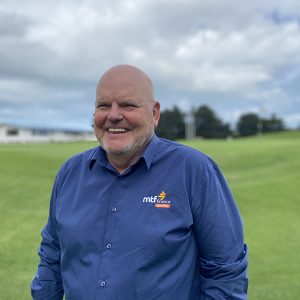Neil Kitchen has for years played in the Eastland Helicopter Rescue Trust’s annual Charity Golf Tournament. Not with any success, he admits. And not thinking he would ever use the rescue service himself.
That was until December 2019, when he was at the Poverty Bay Golf Club’s Awapuni Links playing in a tournament to raise funds for another organisation.
It was about 11am on one of those glorious 30-degree Gisborne days when Neil swung a shot for the fourth hole of the day.
“As the ball landed on the green I felt this pain, like I’d pulled a muscle in the back of my shoulder, and it was a pain that just wouldn’t go away,” he says.
“Then I started to feel nauseous and one of the other players said ‘I know what that is’, and they chucked all the drinks out of the refreshments cart, chucked me in and took me back to the clubhouse.”
Neil’s friends called an ambulance but when it hadn’t arrived after half-an-hour his partner Gaylene Munro, who he’d called early in the piece, drove him to Gisborne Hospital’s ambulance bay.
“That leads straight into the Emergency Department where they took one look at me and said ‘yes sir, you are having a heart attack’” he says.
“That’s not something I ever thought would happen so it came as quite a fright. I’d never had any serious health problems and was walking around five kilometres a day, so nobody has really been able to work out why it happened.”
Neil had suffered an ST-elevation myocardial infarction (STEMI), a serious – and potentially fatal – form of heart attack caused by a blockage of bloodflow.
“They treated me in Gisborne but said I needed to quickly get to Waikato Hospitality’s cardiac unit for specialist care,” he says. “The next thing I knew was there was a pilot and a paramedic standing at the end of my bed saying ‘it’s time to go’, and Gaylene and I were being strapped in the back of a helicopter.”
It was not just any helicopter: the crew were flying ZK-HNP, Trust Tairāwhiti Eastland Rescue Helicopter’s new BK-117 twin-engine aircraft, an upgrade from the single-engine Squirrel it had
previously used.
And his uplift to Waikato made him the first patient the Gisborne-based crew had medivaced out of the region since they had taken delivery of the BK-117 just that week.
“The funny thing was that, as a supporter of the trust, I was invited to a function held at the hangar the night before to mark the arrival of the new helicopter,” Neil says.
“For some reason I never received the invitation so we didn’t go. But I now feel that’s one party I really should have been at!”
Eastland Helicopter Rescue Trust treasurer Ian Parker says if the crew were still operating the Squirrel, Gaylene would not have been able to go.
“Sometimes it is not appropriate to have a support person on board, but at other times it’s really important,” says Ian.
“The increased capacity of the BK-117 allows our team to do that, which is just one of the reasons it is among the most popular rescue helicopters around the world.”
Ever since he moved to Gisborne in 2015 to take over the local franchise for MTF Finance, Neil has been a generous contributor to local organisations.
“When Gaylene and I first drove into town we thought ‘this feels right, we could live here’ and made the decision there and then,” he says.
“And we think supporting a community comes with being part of it, so that is what we focus on doing.”
Organisations like Gisborne Cancer Society, Speedway and SPCA have all be recipients of their donor schedule and the Eastland Helicopter Rescue Trust has been in their sights since day one.
“We love taking part in the golf tournaments and going to the annual charity auction event, and we donate a bit here and there as we can,” says Neil.
“Not long after we moved here there was news of other bases losing their rescue helicopters and I certainly didn’t want to see that happen here. We love Gisborne but parts of it are really isolated or hard to reach and that’s why we’re committed supporters.”
To date, that has taken the form of sponsoring holes in the golf tournament, funding prizes for the auction event, and donating money to help fund critical equipment.
“You never think bad things will happen to you but after I had my turn, all I could think was that I needed to see my daughters,” he says.
“That was the hard part . . . thinking what might have been, and of how quickly we learn how vulnerable we can all be.”
More than three years after his heart attack, Neil Kitchen says he has even more reason to be a staunch supporter of the Eastland Helicopter Rescue Trust and has helped fund equipment from
lifejackets to noise-cancelling helmets.
“I’d never even considered that I’d need the service myself but always thought it was absolutely critical for our community,” he says.
“There is no point in having a rescue helicopter in a base out of the region . . . time is critical and this thing saves lives. I am just so grateful they were there for me in my time of need.”
